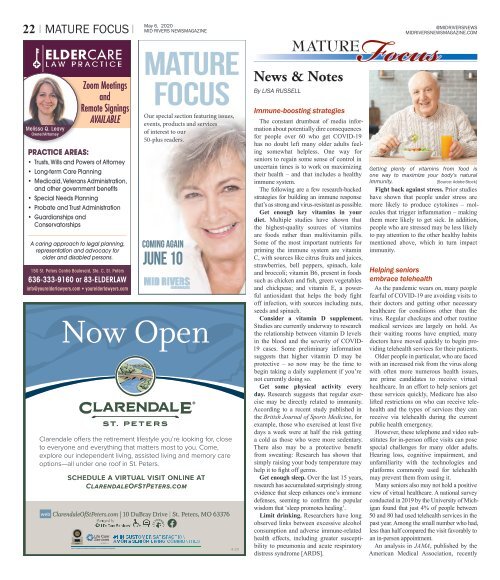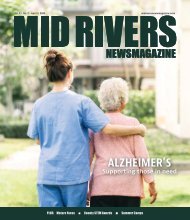Mid Rivers Newsmagazine 5-6-20
Local news, local politics and community events for St. Charles County Missouri.
Local news, local politics and community events for St. Charles County Missouri.
You also want an ePaper? Increase the reach of your titles
YUMPU automatically turns print PDFs into web optimized ePapers that Google loves.
22 I MATURE FOCUS I<br />
May 6, <strong>20</strong><strong>20</strong><br />
MID RIVERS NEWSMAGAZINE<br />
@MIDRIVERSNEWS<br />
MIDRIVERSNEWSMAGAZINE.COM<br />
Melissa Q. Leavy<br />
Owner/Attorney<br />
Zoom Meetings<br />
and<br />
Remote Signings<br />
AVAILABLE<br />
PRACTICE AREAS:<br />
• Trusts, Wills and Powers of Attorney<br />
• Long-term Care Planning<br />
• Medicaid, Veterans Administration,<br />
and other government benefits<br />
• Special Needs Planning<br />
• Probate and Trust Administration<br />
• Guardianships and<br />
Conservatorships<br />
A caring approach to legal planning,<br />
representation and advocacy for<br />
older and disabled persons.<br />
150 St. Peters Centre Boulevard, Ste. C, St. Peters<br />
636-333-9160 or 83-ELDERLAW<br />
info@yourelderlawyers.com • yourelderlawyers.com<br />
Mature<br />
FOCUS<br />
Our special section featuring issues,<br />
events, products and services<br />
of interest to our<br />
50-plus readers.<br />
COMING AGAIN<br />
June 10<br />
Now Open<br />
Clarendale offers the retirement lifestyle you’re looking for, close<br />
to everyone and everything that matters most to you. Come,<br />
explore our independent living, assisted living and memory care<br />
options—all under one roof in St. Peters.<br />
SCHEDULE A VIRTUAL VISIT ONLINE AT<br />
ClarendaleOfStPeters.com<br />
web ClarendaleOfStPeters.com | 10 DuBray Drive | St. Peters, MO 63376<br />
4-<strong>20</strong><br />
News & Notes<br />
By LISA RUSSELL<br />
Immune-boosting strategies<br />
The constant drumbeat of media information<br />
about potentially dire consequences<br />
for people over 60 who get COVID-19<br />
has no doubt left many older adults feeling<br />
somewhat helpless. One way for<br />
seniors to regain some sense of control in<br />
uncertain times is to work on maximizing<br />
their health – and that includes a healthy<br />
immune system.<br />
The following are a few research-backed<br />
strategies for building an immune response<br />
that’s as strong and virus-resistant as possible.<br />
Get enough key vitamins in your<br />
diet. Multiple studies have shown that<br />
the highest-quality sources of vitamins<br />
are foods rather than multivitamin pills.<br />
Some of the most important nutrients for<br />
priming the immune system are vitamin<br />
C, with sources like citrus fruits and juices,<br />
strawberries, bell peppers, spinach, kale<br />
and broccoli; vitamin B6, present in foods<br />
such as chicken and fish, green vegetables<br />
and chickpeas; and vitamin E, a powerful<br />
antioxidant that helps the body fight<br />
off infection, with sources including nuts,<br />
seeds and spinach.<br />
Consider a vitamin D supplement.<br />
Studies are currently underway to research<br />
the relationship between vitamin D levels<br />
in the blood and the severity of COVID-<br />
19 cases. Some preliminary information<br />
suggests that higher vitamin D may be<br />
protective – so now may be the time to<br />
begin taking a daily supplement if you’re<br />
not currently doing so.<br />
Get some physical activity every<br />
day. Research suggests that regular exercise<br />
may be directly related to immunity.<br />
According to a recent study published in<br />
the British Journal of Sports Medicine, for<br />
example, those who exercised at least five<br />
days a week were at half the risk getting<br />
a cold as those who were more sedentary.<br />
There also may be a protective benefit<br />
from sweating: Research has shown that<br />
simply raising your body temperature may<br />
help it to fight off germs.<br />
Get enough sleep. Over the last 15 years,<br />
research has accumulated surprisingly strong<br />
evidence that sleep enhances one’s immune<br />
defenses, seeming to confirm the popular<br />
wisdom that ‘sleep promotes healing’.<br />
Limit drinking. Researchers have long<br />
observed links between excessive alcohol<br />
consumption and adverse immune-related<br />
health effects, including greater susceptibility<br />
to pneumonia and acute respiratory<br />
distress syndrome [ARDS].<br />
Getting plenty of vitamins from food is<br />
one way to maximize your body’s natural<br />
immunity.<br />
[Source: Adobe Stock]<br />
Fight back against stress. Prior studies<br />
have shown that people under stress are<br />
more likely to produce cytokines – molecules<br />
that trigger inflammation – making<br />
them more likely to get sick. In addition,<br />
people who are stressed may be less likely<br />
to pay attention to the other healthy habits<br />
mentioned above, which in turn impact<br />
immunity.<br />
Helping seniors<br />
embrace telehealth<br />
As the pandemic wears on, many people<br />
fearful of COVID-19 are avoiding visits to<br />
their doctors and getting other necessary<br />
healthcare for conditions other than the<br />
virus. Regular checkups and other routine<br />
medical services are largely on hold. As<br />
their waiting rooms have emptied, many<br />
doctors have moved quickly to begin providing<br />
telehealth services for their patients.<br />
Older people in particular, who are faced<br />
with an increased risk from the virus along<br />
with often more numerous health issues,<br />
are prime candidates to receive virtual<br />
healthcare. In an effort to help seniors get<br />
these services quickly, Medicare has also<br />
lifted restrictions on who can receive telehealth<br />
and the types of services they can<br />
receive via telehealth during the current<br />
public health emergency.<br />
However, these telephone and video substitutes<br />
for in-person office visits can pose<br />
special challenges for many older adults.<br />
Hearing loss, cognitive impairment, and<br />
unfamiliarity with the technologies and<br />
platforms commonly used for telehealth<br />
may prevent them from using it.<br />
Many seniors also may not hold a positive<br />
view of virtual healthcare. A national survey<br />
conducted in <strong>20</strong>19 by the University of Michigan<br />
found that just 4% of people between<br />
50 and 80 had used telehealth services in the<br />
past year. Among the small number who had,<br />
less than half compared the visit favorably to<br />
an in-person appointment.<br />
An analysis in JAMA, published by the<br />
American Medical Association, recently

















